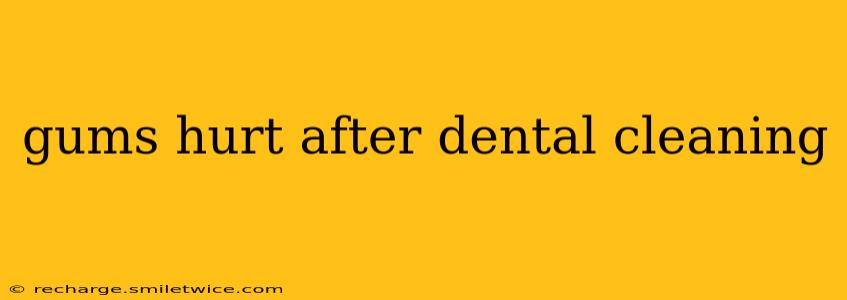Many people experience some degree of gum soreness after a dental cleaning, but understanding why this happens and how to manage it can alleviate discomfort and improve overall oral health. This comprehensive guide explores the common causes of post-cleaning gum sensitivity, effective remedies, and preventative measures to minimize future discomfort.
Why Do My Gums Hurt After a Dental Cleaning?
The most common reason for gum soreness after a cleaning is the removal of plaque and tartar. During a professional cleaning, your hygienist uses specialized tools to scrape away hardened plaque and tartar buildup from your teeth and gum line. This process, while crucial for preventing gum disease, can irritate the gum tissue, leading to temporary sensitivity and pain. The gums are essentially being "scrubbed" clean, which can be slightly traumatic.
Another factor is the depth of cleaning. If you have existing gum inflammation (gingivitis) or periodontal disease, the cleaning process may involve more aggressive scaling and root planing to remove bacteria and debris below the gum line. This deeper cleaning is more likely to cause temporary discomfort.
Finally, sensitivity to the cleaning tools is a possibility. Some individuals might react to the pressure of the instruments or even experience a minor allergic reaction to the polishing paste. While rare, it's a factor to consider.
How Long Does Gum Soreness After a Cleaning Last?
The duration of gum soreness varies greatly from person to person, but it typically lasts one to three days. For most, the discomfort gradually subsides as the gums heal. However, if the pain persists for longer than a week, or if it's severe, it's crucial to contact your dentist. This could indicate a more serious underlying issue.
What if my gums are still hurting after a week?
If your gum soreness persists for more than a week after your dental cleaning, it's important to contact your dentist. Prolonged pain could indicate an infection or other underlying problem that requires attention. Don't hesitate to seek professional advice if you're concerned.
Home Remedies for Sore Gums After a Dental Cleaning
Several at-home remedies can help soothe sore gums and reduce discomfort after a dental cleaning:
- Saltwater Rinse: Dissolve half a teaspoon of salt in a glass of warm water and rinse your mouth gently several times a day. Saltwater has natural antiseptic properties that can help reduce inflammation and promote healing.
- Cold Compress: Applying a cold compress to your cheek can help numb the area and reduce swelling.
- Over-the-counter pain relievers: Ibuprofen or acetaminophen can help manage pain and reduce inflammation. Always follow the dosage instructions on the packaging.
- Gentle brushing: Use a soft-bristled toothbrush and brush gently to avoid further irritation.
- Avoid irritating foods: Steer clear of hot, acidic, or spicy foods, as these can aggravate sensitive gums.
How Can I Prevent Sore Gums After My Next Cleaning?
While some level of discomfort is normal, there are steps you can take to minimize it:
- Maintain excellent oral hygiene: Regular brushing and flossing help prevent plaque buildup, reducing the need for extensive cleaning during your appointment.
- Inform your dentist: Let your dentist or hygienist know if you've experienced gum soreness in the past. They can adjust their technique to minimize discomfort.
- Schedule regular cleanings: Regular checkups and cleanings help prevent the accumulation of plaque and tartar, thus making the cleaning process less intense.
Is it normal for my gums to bleed after a dental cleaning?
Some mild bleeding is normal during and immediately after a dental cleaning, especially if you have gingivitis or periodontitis. This is because the cleaning process can disrupt the gum tissue. However, excessive or persistent bleeding should be reported to your dentist.
Are there any serious complications associated with sore gums after a cleaning?
While typically temporary and mild, severe or prolonged gum pain could be a sign of infection or an underlying condition. Always seek professional advice if your discomfort persists or worsens. Prompt attention prevents further complications.
By understanding the causes of gum soreness after a dental cleaning, utilizing appropriate home remedies, and practicing diligent oral hygiene, you can minimize discomfort and ensure healthy gums. Remember, consistent dental care is key to preventing future issues and maintaining a radiant smile.
